小学五年级下册英语知识点(外研版)
外研社五年级英语下册知识点梳理

外研社五年级英语下册知识点梳理集团档案编码:[YTTR-YTPT28-YTNTL98-UYTYNN08]Module1短语:1、aprogrammeaboutChina 一个关于中国的节目2、manyyearsago 许多年前3、enough 足够多的后面跟可数名词复数或不可数名词4、some “一些”,接可数名词复数或不可数名词,用在肯定句中any “一些”,接可数名词复数或不可数名词,用在否定句中 Ihaveapples. Idon ’thaveapples.Doyouhaveapples5、lotsof=alotof 许多后面跟可数名词复数或不可数名词6、everyday 每天7、Thankyoufordoing 感谢你做了某事 8、and 和or 都表示“和” and 用在肯定句中or 用在否定句和问句中9、talkaboutsb/sth 谈论某人/某物 10、grandchild (复数)grandchildren句子:1、Welivedinasmallhouse.2、Thereweren ’tmanybuses. **Therebe 的过去时:Therewas+a/an+可数名词单数+地点。
Therewas+a/an+不可数名词+地点。
Therewere+可数名词复数(s)+地点。
3、Weliveinabighouse.4、Therearelotsofbusesandcars.5、Hecanjumpreallyfar.Thankyoufordoing 感谢你做了某事 8、Ihopeyouarewell. 9、Howaboutnow语法:一般过去时Module2短语:1、learntodo 学习做某事2、likedoing 喜欢做某事3、studyveryhard 努力学习4、anEnglishteacher 一个英语老师5、动词词尾加上“er ”变成名词,表示职业。
dance--dancerdrive---driverwork--worker farm--farmerteach--teachersing--singer write--writerplay--player另外还有表示职业的单词:nurse (护士)、doctor (医生)、policeman (警察)、firefighter (消防战士)、pupil (小学生)、student (学生) 6、makeacake 做蛋糕 7、不规则动词过去式:learn--learntteach--taughtwrite--wrotedrin -drank(study---studied)句子:1、--Didyourgrandmalearnanyforeignlanguage --Yes,shelearntEnglish.2、He’slearningEnglishnow.Sbbe(am/is/are)doing.某人正在做某事。
(完整版)外研版小学英语五年级下册知识点梳理
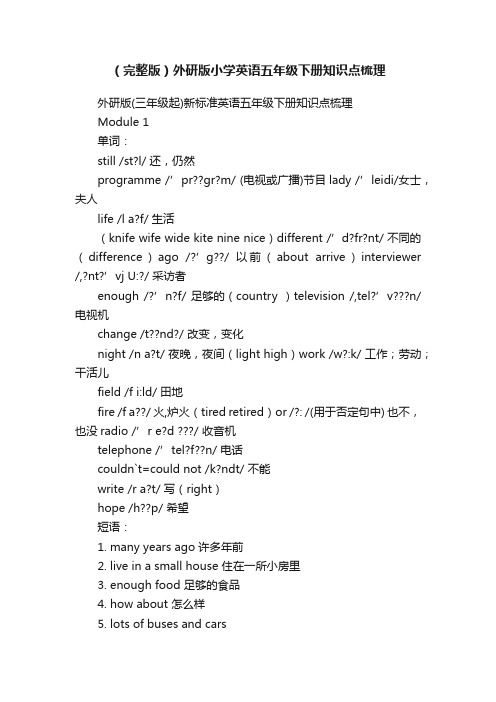
(完整版)外研版小学英语五年级下册知识点梳理外研版(三年级起)新标准英语五年级下册知识点梳理Module 1单词:still /st?l/ 还,仍然programme /’pr??gr?m/ (电视或广播)节目lady /’leidi/女士,夫人life /l a?f/ 生活(knife wife wide kite nine nice)different /’d?fr?nt/ 不同的(difference)ago /?’g??/ 以前(about arrive)interviewer /,?nt?’vj U:?/ 采访者enough /?’n?f/ 足够的(country )television /,tel?’vn/ 电视机change /t??nd?/ 改变,变化night /n a?t/ 夜晚,夜间(light high)work /w?:k/ 工作;劳动;干活儿field /f i:ld/ 田地fire /f a??/ 火,炉火(tired retired)or /?: /(用于否定句中) 也不,也没radio /’r e?d / 收音机telephone /’tel?f??n/ 电话couldn`t=could not /k?ndt/ 不能write /r a?t/ 写(right)hope /h??p/ 希望短语:1. many years ago 许多年前2. live in a small house 住在一所小房里3. enough food 足够的食品4. how about 怎么样5. lots of buses and cars许多公共汽车与小汽车6. every day 每天7. talk to 和……交谈8. last night 昨天晚上9. talk about 谈论10. cook on a fire 在炉火上做饭句子:1.There was(were)+某人或某物+某地2.过去式:We didn’t have enough food .肯定句:主语+动词过去式+其他否定句:主语+be动词过去式+not+其他或主语+did not+动词原形+其他Module 2单词:learnt(learn的过去式)/l?:nt/ 学习taught (teach的过去式) /t?:t/ 教,讲授language /’l??gw?d?/ 语言wrote (write) /r??t/ 写dancer /’dɑ:ns?/舞蹈演员foreign /’f?:r?n/ 外国的studied (study的过去式) /’st?di/ 学习hard /hɑ:d/努力地(park dark card)短语:1. in lots of Chinese cities在许多中国城市2. foreign language 外语3. learn English 学习英语4. in his class 在他的班级5. study hard 努力学习6. an English teacher 一位英语老师7. walk to school 走路去学校8. by school bus 乘坐校车句子:1. 询问他人做过某事的句型及回答Did+主语+动词原形+其他Did she learn any foreign languages? Yes ,人称代词主格+did.No ,人称代词主格+didn’t.2. 描述他人做过某事:She learnt English.3.描述他们现在在做某事:主语+be+动词ing+其他He is learning English now .Module 3单词:hamburger /’h?mb?g?/ 汉堡English /’??gl??/ 英国(式)的breakfast /’brekf?st/早餐,早饭lunch /l?nt?/ 午餐,午饭sandwich /’s?ndw?t?/ 三明治fish and chips/f??t??ps/ 炸鱼加炸薯条traditional /tr?’dn?l/ 传统的dish /d??/ 食品;菜肴gave(give的过去式)/g e?v/ 给tonight /t?’na?t/ 今夜,今晚短语:1. very much 很,非常2. an e-mail from Lingling一封来自玲玲的电子邮件4. about English food 关于英国食物5. have an English breakfast吃了一顿英式早餐6. have …for lunch 吃…作为午餐7. a traditional English dinner一顿传统的英式晚餐8. give …to … 把……给……9. at school 在学校句子:1.描述吃过某些食物:主语+ had + 食物名称+ 其他2.询问他人打算吃/喝什么:What are you going to eat/drink ? 3.询问他人三餐吃了什么:What + did + 主语+have+for breakfast / lunch / dinner ? Module 4单词:library /’l a?br?ri/ 图书馆student /’stj U:d?nt/ 学生sent(send的过去式) /sent/ 发送,寄idea /a?’d??/ 主意,想法put /put/ 放,安放heavy /’hevi/重的,沉的dictionary /’d?k ??n?ri/ 词典;字典card /kɑ:d/卡片ask /ɑ:sk/邀请wrong /r??/错误的dear /d??/ 哎呀information /,?nf?’me n/ 信息project /’pr?d?ekt/ 项目guide /g a?d/ 介绍,指南,手册film /f?lm/ 电影way /w e?/方法,方式on关于短语:1. library card 图书卡,借书证2. on Shelf C 在C架上3. as well /?s wel/ 又,还,也句型:1.询问某物在何处及回答的句型:Where are the …about…, please?Where can you find out about …?You can find out … in / on …Module 5单词:light /l a?t/ 轻的hard /hɑ:d/困难的,费力的department store /d?’pɑ:tm ?ntst ?:/百货商店pocket /’p?k?t/ 口袋,兜umbrella /?m’brel?/ 雨伞sales assistant /s e?lz?’s?st?nt/售货员,营业员wheel /w i:l/ 轮子easy / i:zi/ 容易的,不费力的take /t e?k/ 选择要,选择购买too /t U:/ 太,过于try /tr a?/ 试,尝试lovely /’l?li/ 美丽的,可爱的;令人愉快的短语:1. at the department store 在百货商店2. buy you a new one 给你买一个新的3. be easy for you 对你来说很容易4. be too…for…对…来说太…5. take…to… 把…带到…句型:1. 描述事物特征的句型:It’s get……(big反义small,heavy反义light,easy反义hard)2. 表达看法:It’s + 形容词+ for +人称代词宾格Module 6单词:moon /m U:n/ 月亮,月球get /get/ 到达west /west/ 西,西部,西方;向西方parent /p e?r?nt/ 母亲;父亲;家长stay /st e?/ 停留(play day say)July /d??’la?/ 七月south /s a?θ/南,南部,南方;向南方remember /r?’memb?/ 记得June / d? U:n/ 六月east / i:st/ 东,东部,东方;向东方best /best/ 最好的north /n?:θ/北,北部,北方;向北方rest /rest/ 休息rode(ride的过去式)/r??d/ 骑短语:1. have a rest 休息一下2. of course 当然3. in the west of China 在中国的西部4. go there 去那儿5. last year 去年6. stay with 和……呆在一起7. in July 在七月8. every year 每年9. Li people 黎族人10. ride a horse 骑马句型:1.用方位词表达地点:It’s in the north / south / east / west of…Module 7单词:evening /‘?v?n??/傍晚,晚上late /l e?t/近日暮的;近深夜的;时间不早的worker /’w?:k?/ 工人factory /’f ?kt?ri/ 制造厂;工厂early /’?:li/ 早的taxi /’t ?ks?/ 出租车,计程车quarter /’kw?:t?/ 一刻钟to(距整点)差......worry /’w?ri/ 焦虑,担心短语:1. go to work 上班2. be home 在家句型:1. My father goes to work at eight o’clock every morning.2. What does he do?He’s a policeman/worker.3. What does she do?She’s a taxi driver.4.Will you be home at seven o’clock? Yes,I will. I’ll be home at seven o’clock.5. What time will you be home?I’ll be home at seven o’clock.6.英语时间的表达法:1)整点:8:00——eight o’clock2)分钟小于或等于30,就用past来表示,结构:分钟+ past + 该点钟12:05—— five past twelve9:30——half past nine3)分钟大于30,就用to来表示,结构:分钟+ to + 下一点钟8:40——twenty to nine4)分钟是15,一般用a quarter 来代替fifteen。
五下外研版英语知识点归纳

五下外研版英语知识点归纳第一单元:My New Teachers1. 人称代词的用法:I, you, he, she, it, we, they。
2. 动词be的用法:am, is, are。
3. 询问及回答姓名、年龄、班级等基本信息。
4. 询问及回答他人的姓名、年龄、班级等基本信息。
5. 询问及回答自己喜欢的科目和老师。
第二单元:At the Farm1. 名词所有格的用法:’s或s’。
2. 数词的读法及用法。
3. 表示“有”的句型:There is/are。
4. 自然界的事物的名称及特征。
5. 描述农场的事物的名称及特征。
第三单元:Where’s My Schoolbag?1. 表示位置的介词:in, on, under, behind。
2. 描述教室及物品的位置。
第四单元:What’s for Dinner?1. 表示物品的数量的基数词:one, two, three,等。
2. 表示物品的数量的序数词:first, second, third,等。
3. 描述食物的名称及口味。
4. 询问及回答想要吃的食物。
第五单元:Doing Housework1. 表示活动的动词:clean, sweep, make, do等。
2. 描述家庭活动及物品的用途。
3. 询问及回答自己平时做的家务活。
第六单元:Weather Report1. 表示天气的形容词:sunny, rainy, cloudy, windy等。
2. 描述不同季节的天气。
3. 询问及回答今天的天气情况。
第七单元:On April Fool’s Day1. 表示时间的基数词:one, two, three,等。
2. 表示时间的序数词:first, second, third,等。
3. 描述过去发生的事情。
4. 询问及回答自己在过去的某个时间所做的事情。
第八单元:Going to the Grand Canyon1. 表示地点的介词:in, on, under, behind。
最新外研版五年级下英语知识点整理
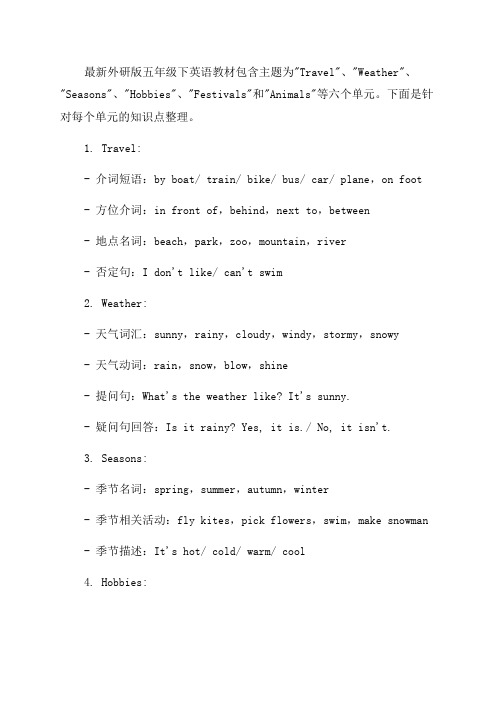
最新外研版五年级下英语教材包含主题为"Travel"、"Weather"、"Seasons"、"Hobbies"、"Festivals"和"Animals"等六个单元。
下面是针对每个单元的知识点整理。
1. Travel:- 介词短语:by boat/ train/ bike/ bus/ car/ plane,on foot - 方位介词:in front of,behind,next to,between- 地点名词:beach,park,zoo,mountain,river- 否定句:I don't like/ can't swim2. Weather:- 天气词汇:sunny,rainy,cloudy,windy,stormy,snowy- 天气动词:rain,snow,blow,shine- 提问句:What's the weather like? It's sunny.- 疑问句回答:Is it rainy? Yes, it is./ No, it isn't.3. Seasons:- 季节名词:spring,summer,autumn,winter- 季节相关活动:fly kites,pick flowers,swim,make snowman - 季节描述:It's hot/ cold/ warm/ cool4. Hobbies:- 爱好动词:read books,draw pictures,paint,play basketball,play football,play the piano/ guitar- 提问句:What do you like doing? I like playing the piano.5. Festivals:- 节日名词:Easter,Christmas,Halloween,New Year's Day,Spring Festival- 节日活动:have a big meal,give/ receive presents,make lanterns,wear costumes- 时间介词:on Easter Sunday,on Christmas Day6. Animals:- 动物名词:elephant,panda,dolphin,parrot,tiger,lion,kangaroo,penguin- 动物特征:big/ small,long/ short,smart,clever,strong- 并列句:I like pandas and tigers.除了以上的知识点外,五年级下还包含了一些英语规则和语法知识点:-一般现在时的肯定句、否定句和疑问句的构成- be动词的一般现在时和一般过去时的构成-具体名词和抽象名词的区别- 常见指示代词:this,that,these,those-形容词的比较级和最高级的构成-以-y结尾的单词的变化规则-双辅音结尾的单词的变化规则-句子中时间状语的位置。
外研版五年级下册英语重点内容总结

外研版五年级下册英语重点内容总结Unit 1: My World- Key vocabulary: school, classroom, desk, chair, board, book, pen, pencil, ruler, eraser- Key grammar: "This is my classroom." "I have a book."- Important phrases: "Hello, everyone." "Goodbye, teacher."Unit 2: My Clothes- Key vocabulary: T-shirt, dress, skirt, pants, shorts, shoes, socks, hat, coat- Key grammar: "I like my T-shirt." "I don't like pants."- Important phrases: "What are you wearing?" "I am wearing a skirt."Unit 3: My Family- Key vocabulary: father, mother, brother, sister, baby, grandfather, grandmother- Key grammar: "This is my family." "I have a brother."- Important phrases: "How many people are there in your family?" "I have a baby sister."Unit 4: My Toys- Important phrases: "What's your favorite toy?" "My favorite toy is a teddy bear."Unit 5: My Schoolbag- Key vocabulary: schoolbag, pencil case, notebook, textbook, crayon, colored pencil, calculator, sharpener- Key grammar: "I have a schoolbag." "I don't have a notebook."- Important phrases: "What's in your schoolbag?" "In my schoolbag, there is a textbook and a pencil case."Unit 6: My Body- Key vocabulary: head, eye, ear, nose, mouth, hand, arm, leg, foot - Key grammar: "I have two arms." "I don't have a big nose."- Important phrases: "How many eyes do you have?" "I have two eyes."Unit 7: My Face- Key vocabulary: face, hair, forehead, eyebrow, eyelash, cheek, nose, mouth, tooth- Key grammar: "I have a round face." "I don't have long hair."- Important phrases: "What color are your eyes?" "My eyes are brown."Unit 8: My Pets- Key vocabulary: dog, cat, fish, bird, rabbit, hamster, turtle, mouse - Key grammar: "I have a pet dog." "I don't have a pet bird."- Important phrases: "Do you have any pets?" "Yes, I have a cat."Unit 9: My Friends- Key vocabulary: friend, boy, girl, classmate, best friend, playmate, team, group- Key grammar: "He is my friend." "She is my best friend."- Important phrases: "Who is your best friend?" "My best friend is Lisa."Unit 10: My City- Key vocabulary: city, park, street, house, building, shop, zoo, museum- Key grammar: "I live in a city." "I don't live in a house."- Important phrases: "What places are there in your city?" "There is a park and a museum."Unit 11: My Day- Key vocabulary: morning, afternoon, evening, night, breakfast, lunch, dinner, homework- Key grammar: "I have breakfast in the morning." "I don't have dinner at night."- Important phrases: "What do you do in the evening?" "I do my homework."Unit 12: My Week- Key vocabulary: Monday, Tuesday, Wednesday, Thursday, Friday, Saturday, Sunday, weekend- Key grammar: "Today is Monday." "Tomorrow is Tuesday."- Important phrases: "What day is it today?" "It is Wednesday."Unit 13: My Birthday- Key vocabulary: cake, party, present, candle, balloon, hat, invitation, celebrate- Key grammar: "Today is my birthday." "I don't have a birthday cake."- Important phrases: "When is your birthday?" "My birthday is on May 3rd."。
五年级下册外研版英语知识点总结
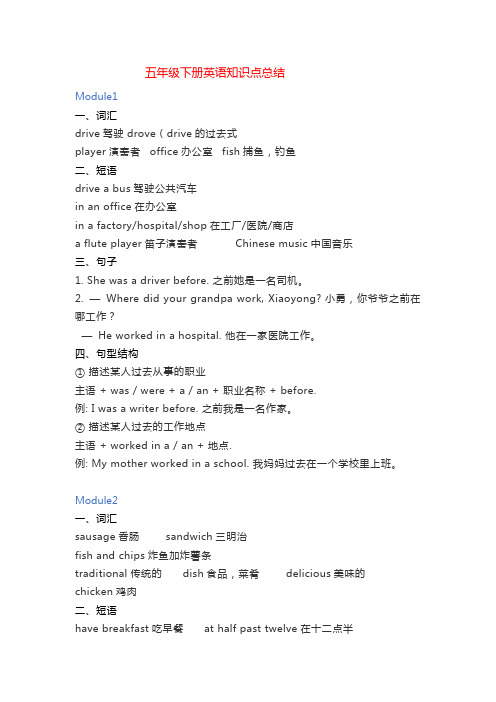
五年级下册英语知识点总结Module1一、词汇drive驾驶drove(drive的过去式player演奏者 office办公室 fish捕鱼,钓鱼二、短语drive a bus驾驶公共汽车in an office在办公室in a factory/hospital/shop在工厂/医院/商店a flute player笛子演奏者Chinese music中国音乐三、句子1. She was a driver before. 之前她是一名司机。
2. —Where did your grandpa work, Xiaoyong? 小勇,你爷爷之前在哪工作?—He worked in a hospital. 他在一家医院工作。
四、句型结构①描述某人过去从事的职业主语 + was / were + a / an + 职业名称 + before.例: I was a writer before. 之前我是一名作家。
②描述某人过去的工作地点主语 + worked in a / an + 地点.例: My mother worked in a school. 我妈妈过去在一个学校里上班。
Module2一、词汇sausage香肠sandwich三明治fish and chips炸鱼加炸薯条traditional传统的 dish食品,菜肴delicious美味的chicken鸡肉二、短语have breakfast吃早餐at half past twelve在十二点半三、句子1. —What did she have for breakfast? 早饭她吃了什么?—She had eggs and sausages. 她吃了鸡蛋和香肠。
2. It’s a traditional English dish. 它是传统的英式早餐。
四、句型结构询问某人一日三餐吃了什么—What did + 主语 + have for + breakfast / lunch / dinner?—He / She had ...例: —What did Lance have for dinner? 兰斯晚餐吃了什么?—He had noodles and an apple. 他吃了面条和一个苹果。
外研版五年级下册英语复习重点
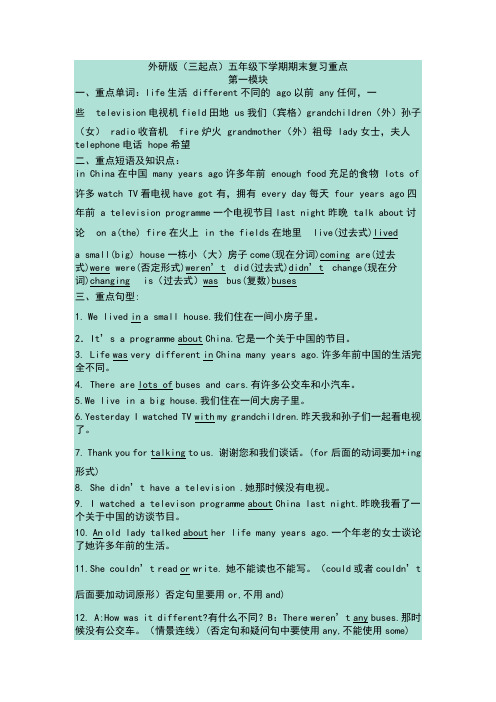
外研版(三起点)五年级下学期期末复习重点第一模块一、重点单词:life生活different不同的ago以前any任何,一些television电视机field田地us我们(宾格)grandchildren(外)孙子(女)radio收音机fire炉火grandmother(外)祖母lady女士,夫人telephone电话hope希望二、重点短语及知识点:in China在中国many years ago许多年前enough food充足的食物lots of 许多watch TV看电视have got有,拥有every day每天four years ago四年前 a television programme一个电视节目last night昨晚talk about讨论on a(the) fire在火上in the fields在地里live(过去式)liveda small(big) house一栋小(大)房子come(现在分词)coming are(过去式)were were(否定形式)weren’t did(过去式)didn’t change(现在分词)changing is(过去式)was bus(复数)buses三、重点句型:1.We lived in a small house.我们住在一间小房子里。
2.It’s a programme about China.它是一个关于中国的节目。
3. Life was very different in China many years ago.许多年前中国的生活完全不同。
4. There are lots of buses and cars.有许多公交车和小汽车。
5.We live in a big house.我们住在一间大房子里。
6.Yesterday I watched TV with my grandchildren.昨天我和孙子们一起看电视了。
外研版五年级英语下册期末复习重点
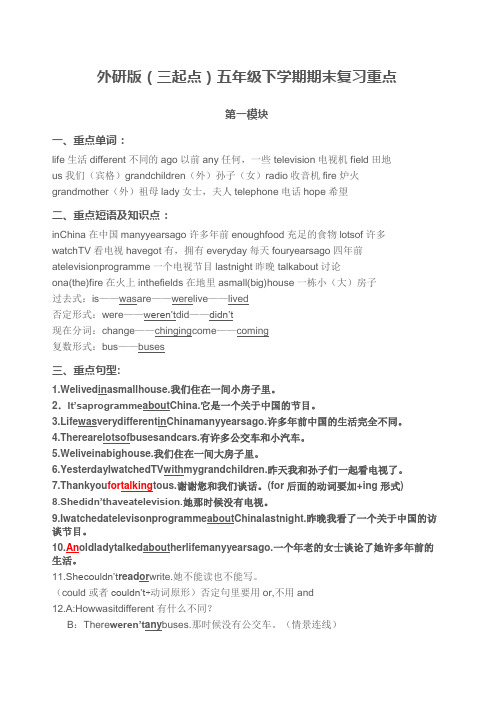
外研版(三起点)五年级下学期期末复习重点第一模块一、重点单词:life生活different不同的ago以前any任何,一些television电视机field田地us我们(宾格)grandchildren(外)孙子(女)radio收音机fire炉火grandmother(外)祖母lady女士,夫人telephone电话hope希望二、重点短语及知识点:inChina在中国manyyearsago许多年前enoughfood充足的食物lotsof许多watchTV看电视havegot有,拥有everyday每天fouryearsago四年前atelevisionprogramme一个电视节目lastnight昨晚talkabout讨论ona(the)fire在火上inthefields在地里asmall(big)house一栋小(大)房子过去式:is——wasare——werelive——lived否定形式:were——weren’t did——didn’t现在分词:change——chingingcome——coming复数形式:bus——buses三、重点句型:1.Welivedinasmallhouse.我们住在一间小房子里。
2.It’saprogramme aboutChina.它是一个关于中国的节目。
3.LifewasverydifferentinChinamanyyearsago.许多年前中国的生活完全不同。
4.Therearelotsofbusesandcars.有许多公交车和小汽车。
5.Weliveinabighouse.我们住在一间大房子里。
6.YesterdayIwatchedTVwithmygrandchildren.昨天我和孙子们一起看电视了。
7.Thankyou fortalking tous.谢谢您和我们谈话。
(for后面的动词要加+ing形式)8.Shedidn’thaveatelevision.她那时候没有电视。
- 1、下载文档前请自行甄别文档内容的完整性,平台不提供额外的编辑、内容补充、找答案等附加服务。
- 2、"仅部分预览"的文档,不可在线预览部分如存在完整性等问题,可反馈申请退款(可完整预览的文档不适用该条件!)。
- 3、如文档侵犯您的权益,请联系客服反馈,我们会尽快为您处理(人工客服工作时间:9:00-18:30)。
Module 6 重点单词 : photo 照片
小学五年级下册英语知识点 ( 外研版 )
(外研版 )小学五年级英语下册重点 Module 1 重点单词 1. life 生活 2、 different 不同的 3、 ago 以前 4、 any 任何 ,一些 5、 television 电视机 6、 grandchildren(外)孙子 (女)7、 us 我们 (宾格 )8、 grandmother(外 )祖母 9、 lady 女士 ,夫人 10、 fire 炉火 11、 radio 收音机 12、 telephone电话 13、 field 田地 14、 hope希望 1、 live in 居住在 2、 still in England 仍然在英国 3、 a programme about China一个关于中国的节目 4、 talk about her life 谈论她的生活 5、 last night 昨晚 6、 miss China 想念中国 7、 many years ago许多年以前 8、 watch a television programme 瞧一个电视节目 9、 enough food 足够的食物 10、 How about、、、、?、、、、怎么样? 11、 talk to、、、、与、、、、、谈话 12、every day 每天 重点句子 1、 There weren'tany buses、没有任何公共汽车。 (否定句与疑问句中要使用 any, 不能使用 some ) 2、 We lived in a small house、我们住在一所小房子里。 3、 There are lots of buses and ca、rs 有许多公共汽车与小汽车。 4. I`m coming! 我就来! 5. She didn`t have a televisionor a radio、她没有一台电视机与一台收音机。 6、Thank you for talking to us、谢谢您与我们交谈。 ((for 后面的动词要加 +ing 形 式) 7、It ’ s a programmabeout China、它就是一个关于中国的节目 8、Life was verydifferent in China many years ago、许多年前中国的生活完全不同。 9、Yesterday I watched TVwith my grandchildren、昨天我与孙子们一起瞧电视了。 10、She couldn ’ t read or w、rite她不能读也不能写。 (could 或者 couldn ’后t面要加动词原形 ,否定句里要用 or,不用 and) 11、What did you do there? 您在那里干什么? (疑问句中有一个 did 表示过去式 , 所以后面的动词要用原形 ,例如本句中的 do) 12 、 Come and watch。(and 连接的两个动词的形式应该一样 ) 13.China is changing。中国在变化。 Module 2 重点单词 :1、(learn 的过去式 learnt)学习 2、 these这些 3、 dancer 舞蹈演员 4、 class班级 5、 study 学习 6、 hard 努力的 7、 retired 退休的 重点短语 : 1. learn English 学英语 2、 wear these clothes穿这些衣服 3、 in lots of Chinese cities 在许多中国城市 【 city(复数 )cities 】4、 foreign language外语 5、 by school bus 乘校车 6、 walk to school 步行去学校 7. be retired 退休 8、 ten years ago十年前 9、 study very hard 学习非常努力 10、 teach Chinese教汉语 11、 a 子
1、 This black bag is nice、 It's big、 这个黑色的包就是漂亮的。它就是大的。
2、 This blue one is big and light、 这个蓝色的就是大的且轻的。 3、 It'll be easy
for her to carry 对她来讲就是提就是容易的。 4、 And it`s (it has)got two pockets、并且它有两个口袋。
小学五年级下册英语知识点 ( 外研版 )
1. library card 图书卡 2、 the books about computer关于计算机的书 3、 Excuse
me、打扰了 /对不起 4、 want to do sth、想做某事 5、 make an e-card for sb、为
某人做电子贺卡 6、 be good a、t 、对、、、擅长 7、 on shelf C 在 C 架上 8、 go
重点短语 1. big and light 大而轻 2、 too big for you 对您太大了 3、 be broken坏了 /破了 3.take it to China 把她带到中国去 5、 buy you a new one给您买一个新的 6. at the Department Store在百货商店 7、 We`ll take it、我们将买它了 7. be easy for sb、对某人来说很容易 9、 try this one in white 试试这个白色的 10、 big(反义词 )small 11、 heavy(反义词 )light 12、 new(反义词 )broken 13、 easy(反义词 )hard 14、 can(否定形式 )can ’ t 15、 she(宾格 )her
小学五年级下册英语知识点 ( 外研版 )
12.dance(过去式 )danced learn(过去式 )learnt learn(现在分词 )learning 13、make(过去式 )made 14、teach(过去式 )taught 15、study(过去式 )studied 16、 go(三单 )goes 17、 dance(名词 )dancer 重点句子 : 1、 Did your grandma learn English? --Yes,she did、 --No,she didn't、 您奶奶学过英语不?就是的 ,她学过。不 ,她没学过。 2. He's learning English now、 她现在正在学英语。 3. Why is she wearing these clothes?为什么她穿这些衣服? Becauseshe was a dance、r 因为她就是一个舞蹈家。 4. What did she do yesterday?She make a cak、e昨天她做什么了?她做蛋糕了。 5、Chen Hai is an English teache、r 陈海就是一位英语老师。 (English前面要用 an) 6、He is learning English now、她现在正在学习英语。 (now 表示现在进行时 ,所以 learn 后面 +ing) 7、She learnt to dance 她学习跳舞。 8、He likes working at school。 (like 后跟动词 ing 形式强调爱好。跟动词不定时 强调动作 ) Module 3 重点单词 : 1、 egg 鸡蛋 2、 email 电子邮件 3、 sandwich 三明治 4、 traditional 传统的 5、 delicious 美味的 ,可口的 6、 hamburger汉堡 7、 (eat 的过去式 ate)吃 8、 (give 的过去式 gave)给 9、(drink 的过去式 drank)喝 10、 tonight 今夜 ,今晚 重点短语 : 1. an email from Lingling 一封来自玲玲电子邮件 2、English food 英国食物 3、 have an English breakfast吃一顿英式早饭 4、 fish and chips 鱼与薯条 5、 cook Chinese food 做中国食物 6、 a traditional English dinner 一顿传统的英式晚餐 7、 have breakfast吃早饭 8、 have lunch 吃午饭 9、 have dinner吃晚饭 10、 give one appleto my dog 给我的小狗一个苹果 重点句子 : 1、 What did she havefor breakfast? 她早餐吃的就是什么? (三餐前用介词 for) --I had eggs and sausage、s 我吃了就是鸡蛋与香肠。 2、 What did you eat last night? --I ate fish and chips、 您昨天晚上吃的就是什么? 我吃的就是鱼与薯条 3、 What are you going to drink tonight ? 今晚您打算喝什么?
16、in this newspaper在这张报纸里 17、 in this library 在这个图书馆里 18、 at the zoo在动物园里 19、 on TV 在电视上 20、buy(过去式 )bought 21、 as well 也 重点句子 :
1. Let ’s (Let us)go to the library、 让我们一起去图书馆。
to the library 去图书馆 9、 bring back 带回来 10、 in two week`s time 在两周
